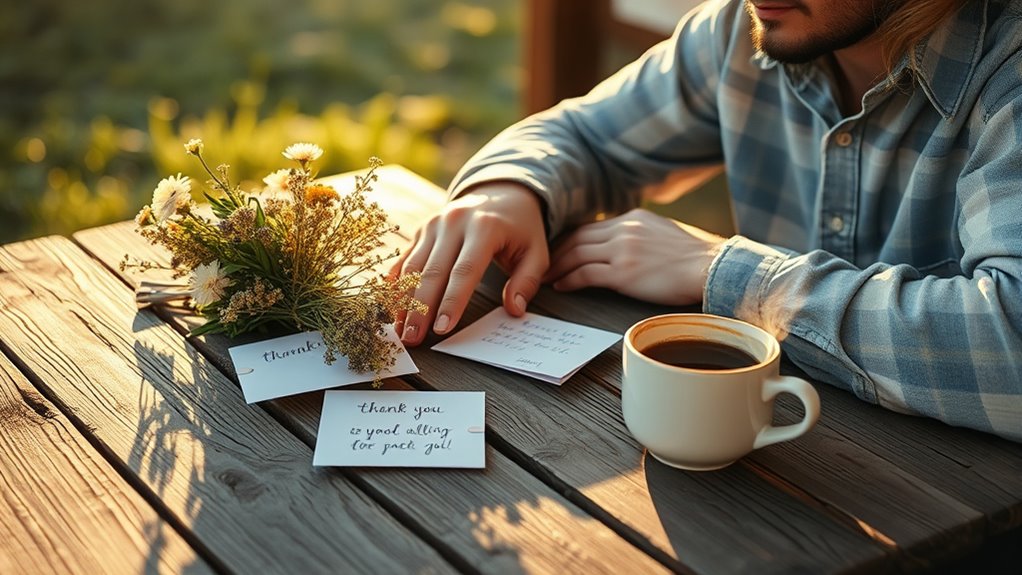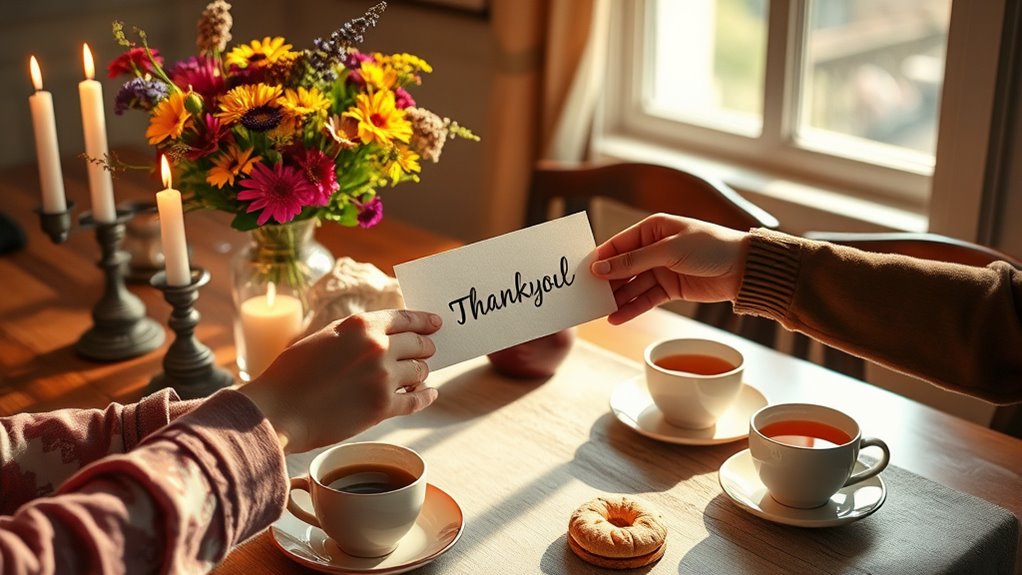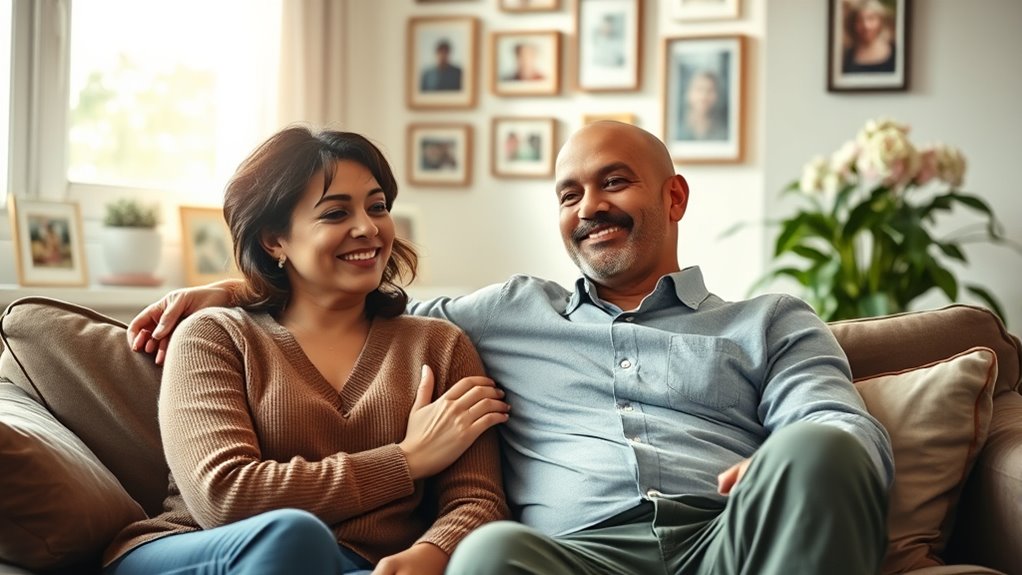To express gratitude in relationships, focus on acknowledging daily contributions with specific, heartfelt thanks. Use verbal and written words to reinforce appreciation, making your partner feel valued and understood. Incorporate regular rituals like notes or morning reflections, and model gratitude through your actions, such as eye contact or small gestures. Pay attention to emotional cues, turning challenges into opportunities for acknowledgment. Keep exploring ways to deepen your connection—it all starts with genuine gratitude, and there’s more to discover.
Key Takeaways
- Be specific and genuine when expressing appreciation, highlighting particular actions or qualities you value.
- Use both verbal and written gratitude, such as heartfelt words and thoughtful notes, to reinforce appreciation.
- Recognize and respond to emotional cues to deepen connection and show understanding and empathy.
- Incorporate daily appreciation rituals, like gratitude journaling or morning reflections, to make gratitude consistent.
- Turn challenges into opportunities by acknowledging efforts during difficult moments and fostering teamwork.
Recognize Daily Contributions

Recognizing daily contributions is a simple yet powerful way to strengthen your relationship. Small gestures, like doing the dishes or taking out the trash, often go unnoticed but matter a lot. When you notice and acknowledge these efforts, it shows unexpected gratitude that makes your partner feel appreciated. You don’t need grand actions; often, it’s the little things that build trust and connection. Saying “thanks” genuinely for everyday help reinforces positive behavior and encourages more kindness. This habit helps break the cycle of taking each other for granted. By intentionally recognizing routine contributions, you foster a culture of appreciation, making both of you feel seen and valued every day. Small acts of gratitude can transform your relationship over time.
Be Specific and Genuine in Your Praise

While acknowledging routine contributions is important, making your praise more specific and genuine can have an even deeper impact. Use tone modulation to convey sincerity—avoid sounding robotic or superficial. When praising, focus on detailed behaviors or qualities, like “I appreciate how you handled that difficult conversation with patience,” rather than generic compliments. Pay attention to non-verbal cues, such as eye contact, a warm smile, or gentle touch, to reinforce your sincerity. These cues help your partner feel truly seen and appreciated. Authentic praise shows you’re attentive and genuine, strengthening trust and emotional connection. Recognizing the importance of specific feedback can enhance your ability to offer meaningful appreciation. Remember, specific and heartfelt recognition encourages your partner to continue positive actions and fosters a supportive, respectful relationship.
Use Verbal and Written Expressions of Thanks

Using both verbal and written expressions of thanks can substantially strengthen your relationship by making appreciation clear and memorable. When you express gratitude verbally, pay attention to non-verbal cues like eye contact, a warm smile, or a gentle touch to enhance your message. Timing considerations are essential; expressing thanks soon after an action shows genuine appreciation and prevents it from feeling delayed or insincere. Written thanks, like notes or messages, create tangible reminders of your appreciation and can be revisited during tough times. Be specific about what you’re grateful for to deepen the impact. Recognizing narcissistic traits can help you better understand the motivations behind certain behaviors and foster healthier communication. Combining timely verbal praise with thoughtful written expressions helps reinforce positive behaviors and fosters a culture of gratitude, making both partners feel valued and understood.
Incorporate Rituals and Habits of Appreciation

Creating daily appreciation rituals helps keep gratitude a consistent part of your relationship. Personalizing your expressions makes them feel more genuine and meaningful. By establishing regular acknowledgment practices, you build a habit that strengthens your connection over time.
Daily Appreciation Rituals
Establishing daily appreciation rituals can considerably strengthen your relationship by making gratitude a consistent part of your routine. When you practice mindful awareness, you become more attuned to your partner’s efforts. Incorporate gratitude journaling each evening, jotting down specific things you appreciated that day. This habit keeps appreciation fresh and genuine. You might also set aside a moment each morning to silently reflect on what you’re thankful for in your partner. Simple actions, like leaving a heartfelt note or sharing a quick thank you, reinforce positive feelings. These rituals create a foundation of appreciation that nurtures connection and trust over time. Engaging in daily routines like these can also serve as a form of self-care, promoting emotional well-being for both partners.
Personalize Your Gratitude
Personalizing your gratitude involves weaving appreciation into daily routines in meaningful ways that resonate with both you and your partner. Use personalized gestures and unique expressions to make your acknowledgment genuine and memorable. Small rituals, like handwritten notes or special routines, reinforce your appreciation authentically. These rituals create a sense of intentionality and deepen emotional connection. To help visualize, consider these ideas:
| Daily Gesture | Unique Expression | Special Ritual |
|---|---|---|
| Saying “thank you” in person | Writing a heartfelt letter | Sharing gratitude during meals |
| Giving a small gift | Complimenting specific qualities | Creating a gratitude jar |
| Sending a quick text | Remembering important dates | Monthly appreciation date |
In addition, incorporating consistent effort into your routines helps maintain a genuine sense of appreciation over time.
Consistent Acknowledgment Practices
Developing consistent acknowledgment practices means making gratitude a regular part of your daily routine. You can incorporate habits like gratitude journaling, where you reflect on what you appreciate about your partner each day. Spontaneous thankfulness keeps appreciation fresh and genuine, strengthening your connection. To build these habits, consider:
- Setting aside a few minutes daily to write or think about specific things you’re grateful for
- Creating small rituals, like morning greetings or evening reflections, to express appreciation
- Noticing and verbalizing everyday actions that often go unnoticed
- Using reminders or notes to reinforce your gratitude practice throughout the day
- Ensuring your gratitude practices are consistent to truly influence your relationship positively
These consistent practices help cultivate a culture of appreciation, making gratitude an automatic part of your relationship and deepening your bond over time.
Model Gratitude Through Your Actions

Modeling gratitude through your actions involves consistently demonstrating appreciation in ways that speak louder than words. Gesture consistency is key—small, intentional acts show your partner you truly value them. Use nonverbal cues like eye contact, a warm smile, or gentle touches to reinforce your appreciation without words. These actions create a physical presence of gratitude that strengthens emotional bonds. When your behaviors align with your words, your partner perceives genuine recognition and feels more secure in the relationship. By consistently showing gratitude through actions, you set a powerful example that encourages your partner to reciprocate. Over time, this active demonstration of appreciation cultivates trust, respect, and a shared culture of thankfulness that sustains your connection. Incorporating practices like self-reflection helps you stay mindful of how your actions impact the relationship and fosters ongoing growth.
Focus on Emotional Connection and Empathy

To deepen your emotional connection, you need to practice active listening and really pay attention to your partner’s words and feelings. Recognizing emotional cues helps you understand what they’re truly experiencing beyond their words. When you express genuine appreciation, it reinforces trust and shows you value their emotions, strengthening your bond. Paying attention to color accuracy can also help you better perceive their emotional state through subtle visual cues.
Active Listening Techniques
Active listening is a powerful way to deepen emotional connection and show empathy in your relationship. When you truly pay attention, you demonstrate emotional intelligence and create space for your partner to feel heard. Use non-verbal cues like nodding, maintaining eye contact, and leaning slightly forward to show engagement. Reflect your partner’s feelings by paraphrasing or validating their emotions, fostering trust. Be mindful of your body language, facial expressions, and tone—these cues reinforce your attentiveness. By focusing on these active listening techniques, you encourage openness and understanding. This approach nurtures emotional bonds and helps your partner feel valued and respected. Remember, your genuine presence can transform everyday conversations into meaningful exchanges. Incorporating attentive communication strategies can further enhance your connection and foster greater empathy.
Recognizing Emotional Cues
Recognizing emotional cues is essential for building deeper empathy and strengthening your emotional connection with your partner. You can do this by paying close attention to nonverbal cues like facial expressions, body language, and tone of voice. These signals often reveal feelings that words might not express. Improving your emotional intelligence helps you interpret these cues accurately, allowing you to respond with sensitivity. When you notice signs of stress, happiness, or discomfort, acknowledge them genuinely. Doing so shows your partner you’re tuned in and care about their emotional state. By honing your awareness of these cues, you create a safe space for honest communication, fostering trust and appreciation. Additionally, understanding the Hours Today List can help you plan quality time together when your partner is most receptive. Recognizing emotional cues is a crucial step toward meaningful connection and expressing gratitude effectively.
Expressing Genuine Appreciation
Have you ever noticed how a heartfelt “thank you” can deepen your emotional connection? Genuine appreciation taps into your partner’s emotional intelligence, fostering empathy and understanding. When you express appreciation sincerely, it reflects awareness of their efforts and feelings, strengthening your communication styles. To do this effectively, consider these points:
- Be specific about what you value, highlighting genuine effort.
- Use active listening to truly understand their perspective.
- Match your tone to your partner’s emotional cues for authenticity.
- Show appreciation regularly, not just during special moments.
- Being attentive to emotional cues can significantly enhance the sincerity of your expressions.
Turn Challenges Into Opportunities for Appreciation

When facing difficult moments or disagreements, shifting your perspective to see challenges as opportunities for appreciation can transform the dynamic of your relationship. Instead of viewing conflicts as setbacks, use them for conflict resolution and conflict management by recognizing your partner’s efforts to communicate or compromise. Express appreciation for their patience or willingness to listen, even during tense times. This approach fosters a sense of teamwork and mutual respect. Acknowledging small positive aspects amid difficulties helps both of you feel valued and understood. By turning challenges into moments of gratitude, you create a more resilient connection. This mindset encourages ongoing cooperation, reduces defensiveness, and promotes a constructive atmosphere where appreciation naturally emerges, strengthening your relationship over time.
Encourage Mutual Acknowledgment and Feedback

Encouraging mutual acknowledgment and feedback creates a cycle of appreciation that strengthens your relationship. When you foster emotional vulnerability by openly sharing your feelings and listening to your partner’s, it builds trust and openness. This honesty helps resolve conflicts more effectively, turning disagreements into opportunities for understanding. To promote this, consider:
Fostering emotional openness and honest communication deepens trust and transforms conflicts into growth opportunities.
- Regularly asking for your partner’s honest feedback on your actions
- Expressing appreciation for their efforts, even in small moments
- Creating safe spaces where both of you can share feelings without judgment
- Recognizing and validating each other’s emotional vulnerabilities during conversations
These practices reinforce positive behaviors, deepen emotional connections, and make conflict resolution smoother, fostering a supportive environment where mutual acknowledgment thrives.
Frequently Asked Questions
How Can I Express Gratitude During Difficult or Stressful Times?
During stressful times, you can show gratitude through mindful acknowledgment of your partner’s efforts, even if small. Use sincere gestures like heartfelt words or thoughtful actions to remind them they’re appreciated. Focus on genuine appreciation rather than expectations or criticism. This approach helps create emotional safety, fosters connection, and encourages positive behaviors, making both of you feel seen and valued despite the challenges you face together.
What Are Some Common Mistakes to Avoid When Showing Appreciation?
Avoid making insincere gestures or giving compliments just for the sake of it, as they can feel fake and hurt trust. Don’t neglect consistency; sporadic appreciation can seem superficial or unimportant. Instead, be genuine and intentional with your gratitude. Regularly acknowledge your partner’s efforts, big or small, to build trust and deepen your connection. Consistent, sincere appreciation fosters a healthier, more positive relationship.
How Does Gratitude Impact Long-Term Relationship Stability?
Gratitude strengthens long-term relationship stability by deepening emotional connection and building trust. When you regularly express appreciation, you show your partner that they’re valued, which encourages mutual respect. This consistent acknowledgment fosters a safe space for open communication, reducing misunderstandings. Over time, gratitude reinforces positive behaviors, making your bond more resilient against challenges. Ultimately, it creates a foundation of trust and emotional closeness that sustains your relationship’s longevity.
Can Expressing Gratitude Improve Communication During Conflicts?
Yes, expressing gratitude can improve communication during conflicts by boosting emotional awareness and encouraging active listening. When you thank your partner for their efforts, it fosters respect and openness, making them feel valued. This positive reinforcement reduces defensiveness, helping both of you stay emotionally aware and engaged. As a result, conversations become more constructive, leading to better understanding and solutions, even during tough discussions.
How Do Cultural Differences Influence Gratitude Expressions in Relationships?
Cultural norms shape how you express gratitude and emotional expression in your relationship. In some cultures, verbal thanks and open appreciation are common, fostering closeness. In others, gestures or subtle acts speak louder than words. You might feel encouraged to openly praise your partner or prefer quiet acts of kindness. Recognizing these differences helps you respect each other’s backgrounds, creating a more understanding and connected relationship where gratitude feels genuine and appropriate.
Conclusion
Expressing gratitude strengthens your relationships, making both you and your partner feel valued. Did you know that couples who regularly show appreciation are 50% more likely to report high satisfaction? By recognizing daily efforts, being genuine, and incorporating small rituals, you create a positive cycle of connection. Remember, gratitude isn’t just a feeling—it’s an active choice that deepens bonds and fosters lasting love. Start today, and watch your relationship thrive.










